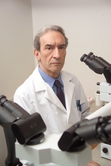Risk-adapted dose-dense immunochemotherapy determined by interim FDG-PET in advanced-stage diffuse large B-cell lymphoma Journal Article
| Authors: | Moskowitz, C. H.; Schoder, H.; Teruya-Feldstein, J.; Sima, C.; Iasonos, A.; Portlock, C. S.; Straus, D.; Noy, A.; Palomba, M. L.; O'Connor, O. A.; Horwitz, S.; Weaver, S. A.; Meikle, J. L.; Filippa, D. A.; Caravelli, J. F.; Hamlin, P. A.; Zelenetz, A. D. |
| Article Title: | Risk-adapted dose-dense immunochemotherapy determined by interim FDG-PET in advanced-stage diffuse large B-cell lymphoma |
| Abstract: | Purpose: In studies of diffuse large B-cell lymphoma, positron emission tomography with [18F]fluorodeoxyglucose (FDG-PET) performed after two to four cycles of chemotherapy has demonstrated prognostic significance. However, some patients treated with immunochemotherapy experience a favorable long-term outcome despite a positive interim FDG-PET scan. To clarify the significance of interim FDG-PET scans, we prospectively studied interim FDG-positive disease within a risk-adapted sequential immunochemotherapy program. Patients and Methods: From March 2002 to November 2006, 98 patients at Memorial Sloan-Kettering Cancer Center received induction therapy with four cycles of accelerated R-CHOP (rituximab + cyclophosphamide, doxorubicin, vincristine, and prednisone) followed by an interim FDG-PET scan. If the FDG-PET scan was negative, patients received three cycles of ICE (ifosfamide, carboplatin, and etoposide) consolidation therapy. If residual FDG-positive disease was seen, patients underwent biopsy; if the biopsy was negative, they also received three cycles of ICE. Patients with a positive biopsy received ICE followed by autologous stem-cell transplantation. Results: At a median follow-up of 44 months, overall and progression-free survival were 90% and 79%, respectively. Ninety-seven patients underwent interim FDG-PET scans; 59 had a negative scan, 51 of whom are progression free. Thirty-eight patients with FDG-PET-positive disease underwent repeat biopsy; 33 were negative, and 26 remain progression free after ICE consolidation therapy. Progression-free survival of interim FDG-PET - positive/biopsy-negative patients was identical to that in patients with a negative interim FDG-PET scan (P = .27). Conclusion: Interim or post-treatment FDG-PET evaluation did not predict outcome with this dose-dense, sequential immunochemotherapy program. Outside of a clinical trial, we recommend biopsy confirmation of an abnormal interim FDG-PET scan before changing therapy. © 2010 by American Society of Clinical Oncology. |
| Keywords: | adolescent; adult; cancer chemotherapy; cancer survival; treatment outcome; aged; middle aged; survival rate; young adult; major clinical study; prednisone; doxorubicin; cancer growth; cancer risk; dose response; drug withdrawal; cancer radiotherapy; cytarabine; methotrexate; rituximab; cancer staging; neurotoxicity; positron emission tomography; follow up; antineoplastic agent; neoplasm staging; prospective study; prospective studies; radiopharmaceuticals; carboplatin; cancer immunotherapy; multiple cycle treatment; etoposide; antineoplastic combined chemotherapy protocols; risk factors; aciclovir; cyclophosphamide; vincristine; autologous stem cell transplantation; tumor biopsy; dose-response relationship, drug; risk factor; ifosfamide; monoclonal antibody; immunology; antibodies, monoclonal; diagnostic agent; fluorodeoxyglucose f 18; fluorodeoxyglucose f18; positron-emission tomography; radiopharmaceutical agent; scintiscanning; large cell lymphoma; lymphoma, large b-cell, diffuse; recombinant granulocyte colony stimulating factor; cotrimoxazole; fluconazole; ifosfamide plus mesna; allopurinol |
| Journal Title: | Journal of Clinical Oncology |
| Volume: | 28 |
| Issue: | 11 |
| ISSN: | 0732-183X |
| Publisher: | American Society of Clinical Oncology |
| Date Published: | 2010-04-10 |
| Start Page: | 1896 |
| End Page: | 1903 |
| Language: | English |
| DOI: | 10.1200/jco.2009.26.5942 |
| PUBMED: | 20212248 |
| PROVIDER: | scopus |
| PMCID: | PMC3651601 |
| DOI/URL: | |
| Notes: | --- - "Cited By (since 1996): 15" - "Export Date: 20 April 2011" - "CODEN: JCOND" - "Source: Scopus" |
Altmetric
Citation Impact
BMJ Impact Analytics
MSK Authors
Related MSK Work


















